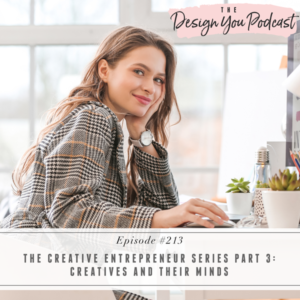
Let’s be honest, our minds are unruly little suckers. Everybody’s mind can be, but the creative mind in itself is a unique place. We are amazing and innovative, and we think differently, but sometimes as creative entrepreneurs, we are holding ourselves back with certain mindsets without realizing it.
Creating new, effective patterns in our brains instead of being all over the place in our lives doesn’t mean that we have to become somebody different. But becoming aware of these common mindsets is key to seeing where you are holding yourself back, and how to stop it.
What I’m sharing with you today is a game-changer friends, so join me to hear some of the mindsets creatives have that are preventing them from creating the life and business they really want, and how these may be showing up for you. I’m showing you how to figure out which of these mindsets are holding you back and giving you a new way to think about your thinking that can help you create different results.





